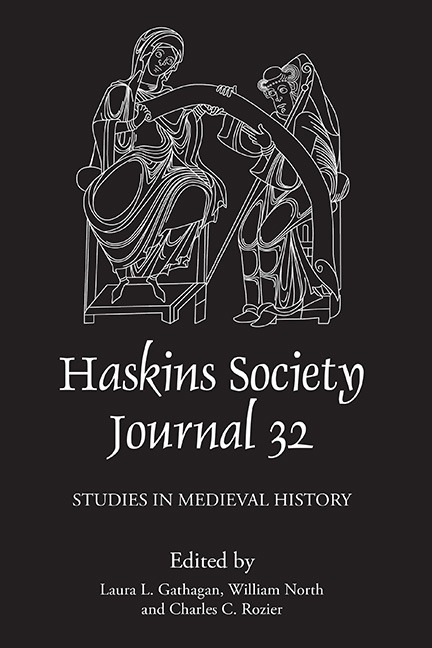Book contents
- Frontmatter
- Contents
- List of Illustrations
- Editors’ Note
- Abbreviations
- 1 Nearly-Not Miracles of the Carolingian Era: A Hypothesis
- 2 Noble Fathers and Low-Status Daughters in the Eleventh Century: Rilint, libera, and Hiltigund, presbyterissa
- 3 The Norman Conquest of England, the Papacy, and the Papal Banner
- 4 Ostmen, Normans, or Norwegians? Names and Identities in the Irish Sea World c. 1100
- 5 The Origins of Administrative Lordship in Medieval Flanders: A Reassessment
- 6 Multiple Allegiance and Its Impact: England and Normandy, 1066–c. 1204
- 7 The Wiley Lecture: Monsters in Anglo-Norman Historiography; Two Notes on William of Newburgh’s Revenants
- 8 A Female King or a Good Wife and a Great Mother? Seals, Coins, and the Epitaphic Legacy of the Empress Matilda
- 9 Harangue or Homily? Walter Espec, Deuteronomy, and the Renewal of the Covenant in Aelred of Rievaulx’s Relatio de Standardo
- 10 Anger Management: Modeling Christian Kingship in Peter of Blois’s Dialogus
- 11 In His Name: Religion as Administrative Strategy in Thirteenth-Century Champagne (and Navarre?)
- 12 Warhorse Markets and Social Status of Combatants under Edward I of England, 1296–1307
9 - Harangue or Homily? Walter Espec, Deuteronomy, and the Renewal of the Covenant in Aelred of Rievaulx’s Relatio de Standardo
Published online by Cambridge University Press: 19 May 2022
- Frontmatter
- Contents
- List of Illustrations
- Editors’ Note
- Abbreviations
- 1 Nearly-Not Miracles of the Carolingian Era: A Hypothesis
- 2 Noble Fathers and Low-Status Daughters in the Eleventh Century: Rilint, libera, and Hiltigund, presbyterissa
- 3 The Norman Conquest of England, the Papacy, and the Papal Banner
- 4 Ostmen, Normans, or Norwegians? Names and Identities in the Irish Sea World c. 1100
- 5 The Origins of Administrative Lordship in Medieval Flanders: A Reassessment
- 6 Multiple Allegiance and Its Impact: England and Normandy, 1066–c. 1204
- 7 The Wiley Lecture: Monsters in Anglo-Norman Historiography; Two Notes on William of Newburgh’s Revenants
- 8 A Female King or a Good Wife and a Great Mother? Seals, Coins, and the Epitaphic Legacy of the Empress Matilda
- 9 Harangue or Homily? Walter Espec, Deuteronomy, and the Renewal of the Covenant in Aelred of Rievaulx’s Relatio de Standardo
- 10 Anger Management: Modeling Christian Kingship in Peter of Blois’s Dialogus
- 11 In His Name: Religion as Administrative Strategy in Thirteenth-Century Champagne (and Navarre?)
- 12 Warhorse Markets and Social Status of Combatants under Edward I of England, 1296–1307
Summary
In 1138, the third year of the long civil war between the cousins Stephen of England and the Empress Matilda, David of Scotland invaded the north of England for the third time that year in support of his niece. With the Scottish army advancing into Yorkshire, and Stephen distracted by rebel barons in the south, the northern defense of the Anglo-Norman realm was left largely to the northern magnates assembled by the aged Archbishop Thurstan of York. With mutual suspicion and even despair rife within the English ranks, it took such a respected figure as Thurstan to rally his army in common cause. To shore up their flagging morale, the archbishop had a war cart mounted with a mast bearing the royal standard and a pyx with the eucharistic host, surrounded by the consecrated banners of the saints of Beverley, Ripon, and York. In many respects, the English rally was given the character of a crusade or defensive holy war. At last, in the mists of Cowton Moor near Northallerton in Yorkshire, Thurstan's army assembled to meet the invader in a pitched engagement that would be remembered as the Battle of the Standard. The Scots were defeated, while David retreated to Carlisle to regroup and consolidate his gains south of the border. He ultimately secured Carlisle and Cumberland for himself and Northumberland for his son Henry through a truce that largely held for the remaining fifteen years of Stephen's reign.
Much lauded by twelfth-century English chroniclers, particularly in the north, the engagement inspired ‘something resembling glee’ in the near-contemporary accounts of John of Worcester (ante 1140), Henry of Huntingdon (c. 1140), and Richard (c. 1140) and John of Hexham (c. 1162–70). With these principal narrative witnesses, however, stands an even more celebrated and unusual historical account of the battle: the Relatio de Standardo or De bello Standardii (‘On the Battle of the Standard’) composed by Aelred, abbot of the Cistercian house of Rievaulx in North Yorkshire between 1153 and 1157. Often considered the jewel of English Cistercianism, Aelred is today remembered in multiple guises.
- Type
- Chapter
- Information
- The Haskins Society Journal 32 2020 Studies in Medieval History , pp. 163 - 184Publisher: Boydell & BrewerPrint publication year: 2021



